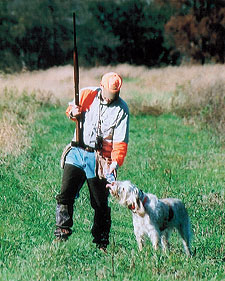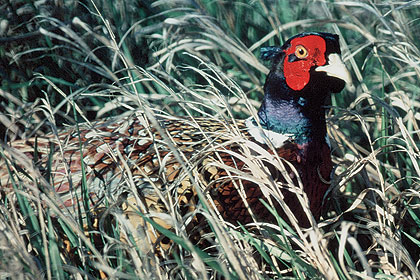A simple mishap ends the pheasant season in style.
By Richard W. Peterson
 Will and Cara with the elusive dog water bottle that triggered a great last-day hunt. |
On January 10, the closing day of the Iowa pheasant season, Will Tremont, an avid bird hunter from Wauconda, Illinois, was set to hunt his Uncle Lewie's farm in Louisa County, Iowa. "Uncle Lewie had told me that my two cousins had hunted the farm the previous Wednesday and hadn't seen a bird," Will explained. "And my uncle added that a fellow who hunts the farm once a year had been there on Sunday with his dog and had come up dry."
With this less than promising report, Tremont had still come to hunt and the negative news did not keep him from having a positive attitude. And the parting shot from Uncle Lewie was, "Will, I don't think there is a pheasant left on this farm this year." Certainly not encouraging words for a last-day hunt this far from Will's home base. But he nevertheless set out on his journey that morning, never dreaming that the loss of his dog's water bottle would provide an interesting twist to an otherwise slow day€¦plus a little lesson on how to find late-season birds.
Will, who is a member of the Spinone Club of America, is very happy with his dog Cara.
Cara is a five-year-old Spinone Italiano, and her papered name is Ruff Creek Orabella.
Will and Cara participated in the Wisconsin River NAVHDA Chapter's natural ability test in May of 2004, where Cara scored a perfect 112 points for a Prize 1. "Cara is my first dog," Will commented. "Armed with Joan Bailey's book, How to Help Gun Dogs Train Themselves, I trained her myself.
"Through a combination of good breeding and luck she has turned into a very good hunting dog. She is not steady to wing and shot, just steady to flush, but since I was not seeking any further hunt test titles, steady to flush is fine with me.
"Besides, when we're hunting wild roosters in Iowa, I want Cara to meet those birds as fast as possible since a few of the ones I shoot hit the ground running."
The area to be hunted was made up of 302 acres, including corn and soybean land that bordered Indian Creek, which is big enough that there is water running in it throughout the year. It was bordered by some harvested cropland along with some strips of CRP on the north side, and directly bordered by some sloping land with a few trees and a good stand of taller grass and some weeds.
The two sides are connected by a concrete dry bridge, locally known as a "Missouri Crossing," to use for a farm machinery crossing. The south side has a small pond about 100 yards from the creek and another pond is about 200 yards in the CRP on the north side. The creek itself cuts a meandering one-mile swath through Uncle Lewie's farm.
"We hunted north of the creek in the morning," said Will. "I finally was able to get my first double on quail. Cara found a covey along the north fenceline, directly north of the pond. She got birdy and pointed at a thicket in the fence line, and I flushed and shot.
"On the flush I got one bird to my right, then I missed a quail that was flying through the cover in the fence line. Then three or four more birds flushed to my left and I dropped one."
After that bit of action Will and Cara headed south to hunt around the north pond and found a single quail and a rooster pheasant but neither bird offered a shot. They continued to cover the area around the waterway where they had taken a bird in December. But they came up dry.
It was after crossing the creek to return to the vehicle, when they were about halfway back, that Will realized he'd lost Cara's water bottle while crossing the deep end of a ditch created by a grownup waterway which entered the creek.
 Roosters often move back into previously hunted cover late in the afternoon. |
During the afternoon hunt they covered all the ground east and west of the lane on the south side of the creek. "Cara got birdy several times in the knee-high CRP but we never got a bird up," Will recalled.
"We finally ended up along the creek bottom in the buckthorn, locust and multi-flora rose, near the spot where I shot a rooster with my old Stevens 311 side-by-side on the day my cousin Jeff and I had hunted together in November€¦Like my dog, I always hunt for the spots where I've bagged a bird in the past."
It was now almost 4 p.m. and they hadn't seen a bird all afternoon. Will decided it was time to head back to the vehicle, but then a thought struck him. "I decided to try to find Cara's water bottle. What I really wanted was the sport nozzle on the bottle that makes it easy to give Cara a drink in the field."
Will was pretty sure he knew where the water bottle had been lost, and he knew he could cross the creek less than 50 yards downstream.
The bottle was in the bottom of the ditch where Will thought it would be, so having retrieved it he decided to hunt the waterway north, even though they had hunted it that morning.
"As we neared the spot where I'd shot the rooster last December, Cara got very birdy.
Fifty yards ahead of me she went on point. I double-timed it to her over the corn stubble.
As I got nearer, Cara's tail flagged then she leaped over the ditch, spun around, and pointed in my direction.
"When I arrived she repositioned again, this time running forward along the edge of the ditch, then whipping around 180 degrees to point in the opposite direction. The bird was moving back and forth in the bottom of the ditch."
Will moved in on this third point and in 30 seconds a squawking rooster boomed up out of the ditch. "I fired a warning shot," Will quipped, "and then triggered the killer. We had our rooster and, more importantly, on the last day of pheasant season we weren't skunked. Cara's bird work was superb."
Will decided to hunt his way back on the north side of the creek. About 200 yards from the truck in a field of knee-high grass, Cara locked up on another point.
"I figured it had to be a hen, but when I walked in a rooster blasted out, up and past me in an ins
tant," Will said. "I turned and shot, once behind, then again, dropping the bird.
"The rooster came down, jumped up, looked around and took off running. Cara arrived at the crash site a half second later, surprised not to find the pheasant there. I hollered 'Dead bird, find it!' And she did. About 30 feet away lay the dead bird."
It was 4:25 and Will and Cara had bagged two roosters in the last 45 minutes of the Iowa season.
"If I hadn't gone back to look for the water bottle, it would have been just a nice afternoon walk, but evidently birds were coming back into some evening roosting territory," Will concluded.
"Instead of a zero, Cara and I had two beautiful roosters, a lesson on re-covering previously hunted ground, and a great story to tell Uncle Lewie."






